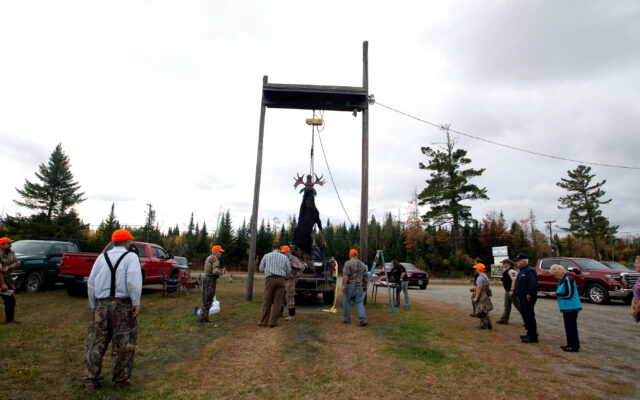
Maine wants to extend its adaptive moose hunt seasons to 2 weeks
By Pete Warner, Bangor Daily News Staff
The adaptive unit moose hunt would be expanded to three segments of two weeks apiece this year under a proposal introduced Tuesday by the Maine Department of Inland Fisheries and Wildlife.
The plan was laid out by DIF&W moose biologist Lee Kantar, who also announced the state’s recommendations for moose permit allocations and changes to moose hunting season dates and Wildlife Management Districts in 2023.
The adaptive hunt is part of an experiment in the western half of WMD 4, known as WMD 4A, in which the state is trying to determine if moose density reduction can break or lessen the threat of winter ticks on moose by encouraging the harvest of more cows and calves.
The state proposes giving those hunters two full weeks (Monday through Saturday) in which to fill their adaptive hunt antlerless permits and help biologists achieve harvest goals.
The adaptive hunt has proven a challenge for hunters and for the state. Last year, the second in which the adaptive hunt model was in place, produced an overall harvest rate of only 26 percent.
That was a significant drop from 52 percent hunter success during the inaugural adaptive hunt in 2021. Thus far, 389 cows and calves have been taken out of a zone that encompasses approximately 1,000 square miles located north of the Golden Road in the North Maine Woods.
The state proposes altering the season dates to include three distinct two-week hunts: Oct 23-Nov. 4, Nov. 6-18 and Nov. 20-Dec. 2.
“We want to expand the amount of time that an adaptive moose hunter can hunt, so the adaptive moose hunter will now get essentially two weeks,” Kantar said.
He explained that simply handing out more permits is not a viable solution for increasing successful harvests. Much of the zone is remote and requires significantly more hunter effort than simply trying to drive wooded roads in search of moose.
If approved, a proposed permit increase would go into effect in the adaptive hunt area, where there would be an additional 50 permits, pushing the total there to 600 antlerless permits. There would be 200 available for each two-week segment.
Under this change, there would be no other moose hunting in Maine from Oct. 23-Dec. 2, Kantar said.
“The problem is, the cow hunt is such a different hunt than what people expect,” Kantar said, comparing it with the early season bull hunt when the animals are receptive to calling.
“And we can’t get by the fact in the North Maine Woods, whether it’s the last few years or whatever, there’s tons of people driving the roads,” he said. “A moose is not going to come across somebody’s windshield and, if it does, I guess you can consider yourself lucky.”
DIF&W proposes increasing the overall number of moose permits this year to 4,155, which is 115 more than last year. Of those, 2,645 would be for antlered moose and 1,510 for antlerless moose.
The plan also calls for another 50 antlerless permits to be issued for WMD 8, the area west of Moosehead Lake.
Last year, during the traditional statewide hunt, a record-low 62 percent of hunters (2,199 of 3,530) successfully killed a moose. The previous low of 65.3 percent occurred in 2014.
The state also wants to expand the model that has allowed hunters selected in WMD 27 or WMD 28 to shoot a moose in either zone to other areas. It proposes combining WMDs 7 and 13 (140 antlered permits), WMDs 12 and 15 (40 antlered permits), and WMDs 14 and 17 (40 antlered permits) with the same rule.
The hope is to provide more opportunity to hunt and increase the harvest in places where moose are less plentiful and harvest numbers are generally low.
A public hearing on the proposed moose hunt and permit changes is scheduled for 4 p.m. on April 18 in Room 400 at the DIF&W headquarters at 343 Water St. in Augusta. The deadline for written comments is April 28.